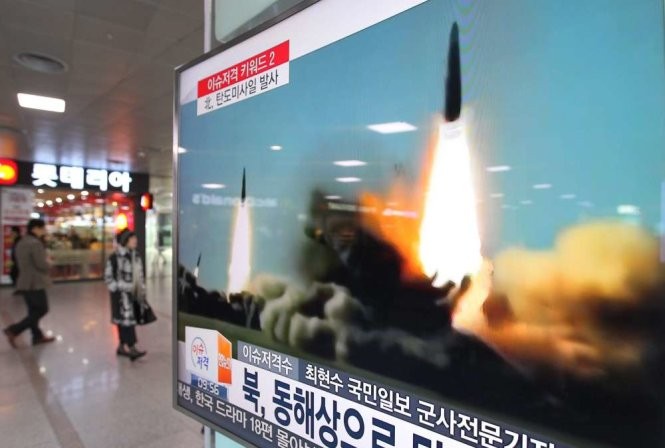(VOVworld) – Northeast Asia, a driving force of the global economy, is unstable with arms escalation, territorial disputes, and political uncertainty in South Korea.
 |
| A South Korean TV news broadcast on North Korean missle launch (Photo: AP) |
2016 witnessed North Korea’s nuclear tests, a US-South Korea joint plan to deploy the Terminal High Altitude Area Defense (THAAD) system, South Korea’s political uncertainty, and Japan’s military buildup. These developments pushed the region into tensions and confrontations.
Korean peninsula like gunpowder keg
The Korean peninsula was a hot spot last year. North Korea conducted 2 nuclear tests and 10 launches of short-range, medium-range, and submarine-launched ballistic missiles. The tests were strongly condemned by the international community. On November 30, the UN Security Council approved a resolution on new sanctions which will cost North Korea 800 million USD per year. It banned 60% of North Korea’s annual export of coal and other mineral resources, and restricted its financial transactions.
Responding to Pyongyang’s provocations, South Korea, the US, and Japan expanded their military buildup and exercises, creating a “vicious circle”.
A US-brokered deal was signed by representatives of South Korea and on November 23, allowing the two neighbors to share sensitive military information without US consent. The move is a big step towards establishing a “Northeast Asian military alliance” and will alter the geo-political situation in Asia-Pacific.
Territorial disputes, South Korean political instability
 |
| Diaoju/Senkaku islands in the East China Sea (Photo: Kyodo) |
In 2016, China and Japan were at odds with each other over islands called by the Chinese Diaoyu and the Japanese Senkaku. Japan’s Self-Defense Forces repeatedly protested the Chinese encroachment into waters claimed by Japan. Japan has reinforced its military presence in the area and increased its defense budget to 5.17 trillion yen for the 2017 fiscal year. Japan’s new security law, which took effect last year, removes the ban on collective self-defense right, allowing the Self-Defense Forces to conduct military activities abroad.
South Korean President Park Geun-hye’s scandal has shocked the Korean politics and affected regional diplomacy. Political factions in South Korea are preparing for an early presidential election.
In Japan, if Prime Minister Shinzo Abe is reelected President of the Liberal Democratic Party (LDP) in 2018 and his party continues to be Japan’s ruling party, Abe’s premiership will continue until 2021. This means Abe’s constitutional reforms and policies will also be continued.
Will the UN Security Council’s sanctions against North Korea’s nuclear program be effective? What direction will South Korean politics take? How far will Japan go with its military and weaponry buildup? Northeast Asia’s geo-political situation contains many unresolved questions.